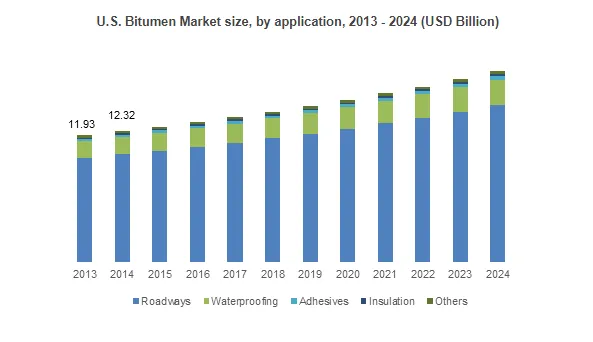
According to the report, the global bitumen market size is chiefly driven by increasing government spending towards road construction, maintenance and repair. It is widely used as binder in road constructions. In 2015, the US road and highway construction business was valued at approximately $100 billion/year and is likely to grow significantly in coming years. In addition, growing roadway usage in cities and counties in Asia Pacific will pave the way for broader roads. High water resistance, viscosity and stickiness, combined with a growing demand for widening roads and creating new roadways will help stimulate bitumen market growth.
Overall construction expenditure was valued at approximately $7 trillion in 2013 and is anticipated to mark $13 trillion by 2024 and is likely to help industry demand. The product is used in manufacturing tyres, paints and coatings, batteries, insulation products and acoustic applications. Growing automotive industry will positively impact the global bitumen market.
Strict environmental regulations towards applications and manufacturing process threaten to impede growth in future years. For instance, the industry is firmly directed by occupational exposure limit. In China, Australia, France and Belgium the limit is confined to 5mg/m3. As the product is obtained from petrochemicals and crude oil, it follows the same price dynamics as crude oil and showed similar sluggish growth in the recent past. Wavering crude and petrochemical prices may impact the bitumen market price trends over the projected period. Nevertheless, emergence of bio-based bitumen is analysed to create new growth avenues for industry players.
Key insights from the report include the predicted bitumen market size of $110 billion/year by 2024, with projected growth at over 4%. It also shows that the polymer modified bitumen market size is expected to gain significantly over the next eight years. Polymers are added to the product in order to enhance physical properties such as elasticity and viscosity, of the product making them desirable high stress applications.
The road paving bitumen market size will see gains at over 2.5% CAGR by 2024. The product segment will see these gains mainly due to rapid road construction and maintenance globally.
Asia Pacific, led by China, is expected to see growth at over 5% by 2024. Strong growth in the regional business is the crucial factor propelling regional growth.
The full report from Global Market Insights can be found on:
%$Linker:








